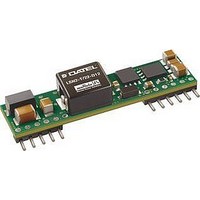LSN2-T/6-D12NG-C Murata Power Solutions Inc, LSN2-T/6-D12NG-C Datasheet - Page 6

LSN2-T/6-D12NG-C
Manufacturer Part Number
LSN2-T/6-D12NG-C
Description
DC/DC Converter
Manufacturer
Murata Power Solutions Inc
Datasheet
1.LSN2-T10-D12G-C.pdf
(15 pages)
Specifications of LSN2-T/6-D12NG-C
No. Of Outputs
1
Input Voltage
8.3V To 14V
Power Rating
30W
Output Current
6A
Approval Bodies
UL, CSA
Supply Voltage
14VDC
Dc / Dc Converter Case Style
SIP
Dc/dc Converter Mounting
Through Hole
Product
Non-Isolated / POL
Output Power
30 W
Input Voltage Range
8.3 V to 14 V
Number Of Outputs
1
Output Voltage (channel 1)
1.75 V to 5 V
Output Current (channel 1)
6 A
Package / Case Size
SIP
Lead Free Status / RoHS Status
Lead free / RoHS Compliant
PARD) may be reduced below specifi ed limits with the installation of additional
external output capacitors. Output capacitors function as true fi lter elements
and should be selected for bulk capacitance, low ESR, and appropriate fre-
quency response. Any scope measurements of PARD should be made directly
at the DC/DC output pins with scope probe ground less than 0.5" in length.
All external capacitors should have appropriate voltage ratings and be located
as close to the converters as possible. Temperature variations for all relevant
parameters should be taken into consideration.
of your line voltage and source impedance, as well as your particular load and
layout conditions.
Input Fusing
Most applications and or safety agencies require the installation of fuses
at the inputs of power conversion components. The LSN2 Series are not
internally fused. Therefore, if input fusing is mandatory, either a normal-blow
or a slow-blow fuse with a value no greater than twice the maximum input
current calculated at low line with the converter's minimum effi ciency should
be installed within the ungrounded input path to the converter.
Output ripple/noise (also referred to as periodic and random deviations or
The most effective combination of external I/O capacitors will be a function
Figure 3. Measuring Output Ripple/Noise (PARD)
Figure 2. Measuring Input Ripple Current
www.murata-ps.com
Safety Considerations
LSN2 SIPs are non-isolated DC/DC converters. In general, all DC/DC’s must
be installed, including considerations for I/O voltages and spacing/separation
requirements, in compliance with relevant safety-agency specifi cations (usually
UL/IEC/EN60950-1).
(safety extra low voltage) requirements, its input must be SELV compliant. If
the output needs to be ELV (extra low voltage), the input must be ELV.
Input Overvoltage and Reverse-Polarity Protection
LSN2 SIP Series DC/DCs do not incorporate either input overvoltage or input
reverse-polarity protection. Input voltages in excess of the specifi ed absolute
maximum ratings and input polarity reversals of longer than “instantaneous”
duration can cause permanent damage to these devices.
Start-Up Time
The V
ramping input voltage crosses the lower limit of the specifi ed input voltage
range and the fully loaded output voltage enters and remains within its speci-
fi ed accuracy band. Actual measured times will vary with input source imped-
ance, external input capacitance, and the slew rate and fi nal value of the input
voltage as it appears to the converter.
On/Off Control with the nominal input voltage already applied to the converter.
The specifi cation defi nes the interval between the time at which the converter
is turned on and the fully loaded output voltage enters and remains within its
specifi ed accuracy band. See Typical Performance Curves.
Remote Sense
LSN2 Series offer an output sense function. The sense function enables
point-of-use regulation for overcoming moderate IR drops in conductors and/
or cabling. Since these are non-isolated devices whose inputs and outputs
usually share the same ground plane, sense is provided only for the +Output.
DC converter’s output. The sense line carries very little current and consequent-
ly requires a minimal cross-sectional-area conductor. As such, it is not a low-
impedance point and must be treated with care in layout and cabling. Sense
lines should be run adjacent to signals (preferably ground), and in cable and/or
discrete-wiring applications, twisted-pair or similar techniques should be used.
the +Output and +Sense pins that do not exceed 10% of V
current and voltage at the converter's output pins. Use of trim and sense
functions can cause the output voltage to increase, thereby increasing output
power beyond the LSN2's specifi ed rating. Therefore:
serves to protect the sense function by limiting the output current fl owing
In particular, for a non-isolated converter’s output voltage to meet SELV
The On/Off to V
The remote sense line is part of the feedback control loop regulating the DC/
The sense function is capable of compensating for voltage drops between
Power derating (output current limiting) is based upon maximum output
The internal 10.5: resistor between +Sense and +Output (see Figure 1)
IN
[V
(V
to V
OUT
OUT
OUT
(+) – Common] – [Sense(+) – Common] d 10%V
at pins) x (I
Start-Up Time is the interval between the time at which a
OUT
Start-Up Time assumes the converter is turned off via the
OUT
) d rated output power
Selectable-Output DC/DC Converters
25 Jun 2010
Non-isolated, DOSA-SIP, 6/10/16A
LSN2 Series
email: sales@murata-ps.com
MDC_LSN2.B07Δ
OUT
OUT
.
Page 6 of 15





















